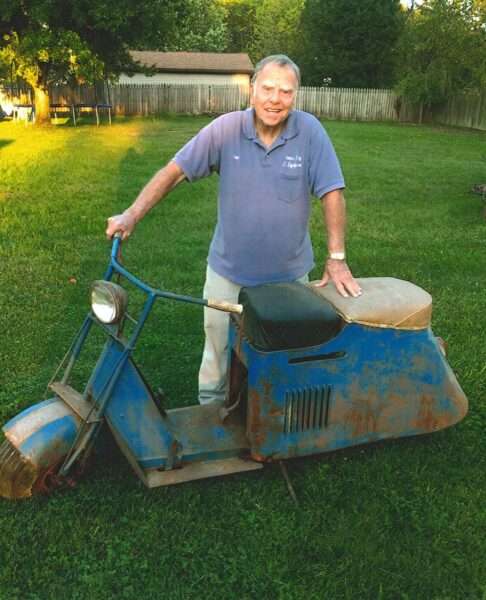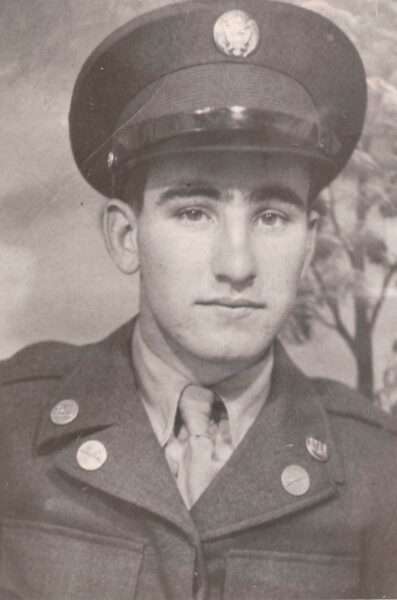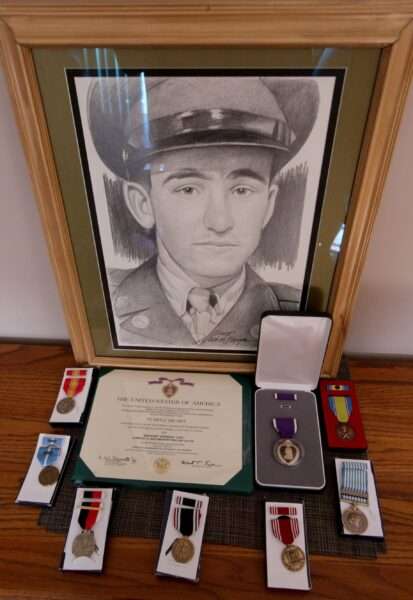A rusted, blue 1946 Cushman motor scooter with a flat tire sits in the shed outside of Kenneth Judd’s Perry Township home.
He meant to have it restored over the years with plans to sandblast it and repaint the old scooter. It was his main mode of transportation as a teenager before he purchased his first car.
Even though it’s been decades since the 83-year-old took the scooter for a ride, it’s more than just a mode of transportation to him.
The motor scooter is one of the few possessions his brother, Army Sgt. Vernon R. Judd, left him.

Kenneth Judd, of Perry Township, with his brother’s 1946 Cushman 50 Pacemaker scooter. Sgt. Vernon R. Judd told his younger brother he could have the scooter if anything happened to him while he was serving in the Korean War. (The Repository/TNS)
Vernon Judd went missing in 1950 after being captured in North Korea. In a letter he wrote while overseas, the elder Judd told his younger brother he could keep the scooter if anything were to happen to him.
Sixty-eight years after his death, Vernon Judd has returned to American soil. His brother and other family members will honor Judd’s memory during a public service at 11 a.m. Tuesday at Spidell Funeral Home in Brewster. Burial with full military honors will follow at the Ohio Western Reserve National Cemetery near Rittman.
Brother identified
An estimated 7,700 U.S. soldiers are listed as missing from the Korean War, and the remains of 5,300 are believed to still be in North Korea, according to the Associated Press. Millions died in the war, including 36,000 American soldiers.

Army Sgt. Vernon R. Judd was reported missing in action on Nov. 28, 1950. (The Repository/TNS)
In July 2018, a U.S. military plane made the trip to North Korea to retrieve 55 cases containing the remains of what was believed to be U.S. servicemen.
Earlier that month, President Donald Trump met with North Korean leader Kim Jong Un. It was during that meeting a promise was made to return the remains.
The remains were flown to Hawaii for analysis and identification at the Defense POW/MIA Accounting Agency laboratory.
A year later, Ken Judd and his family were notified his brother had been identified.
Vernon Judd, a member of Company D, 89th Medium Tank Battalion 25th Infantry Division, was identified using partial remains from the third case to be brought off the plane, said Becky Clark, Casualty Assistance Officer.

A hand-drawn photo of Sgt. Vernon R. Judd, and his service medals are displayed in Kenneth Judd’s Perry Township home. (The Repository/TNS)
Ken Judd and one of his sisters, Grace Fahrni, had provided DNA samples hoping that some day their sibling would be returned home.
“He’s in total shock,” said Jennifer Judd of her father. “He never thought this was going to happen in this lifetime. He’s just so happy to have him home on American soil.”
‘Shadish’s list’
Vernon Judd, known as “Bo-Bo” to his family, set out on his third and last mission during the Korean War at the end of November 1950. He was just six weeks from being relieved of duty and returning home after serving overseas for nearly three years.
At age 22, Judd was declared missing Nov. 28, 1950. He sent a letter home to his family three days before he was taken prisoner.
In February 1954, the Department of Army notified Judd’s parents that a witness stated their son died in a prison camp, according to an article in The Evening Independent.
William Shadish, an Army physician, was in the Hofong Prisoner of War camp, also known as Pukchin-Tarigol, with Judd, Clark said. Shadish survived in the camp for more than 1,000 days, she said.
A handwritten list containing at least 200 names included the service number and date of death for each deceased prisoner, according to Clark. The document, she said, is referred to as “Shadish’s list.”
The document showed Vernon R. Judd died Feb. 15, 1951.
When Shadish returned to the United States, he signed a number of death certificates, including Judd’s. Shadish concluded that Judd, like many other Americans in the camp, died of starvation, exposure and dysentery.
Shadish wrote about his time in the prisoner of war camp in a book titled “When Hell Froze Over.”
In 1954, when Ken Judd and his family were notified of his brother’s death, they did not have a funeral for him. Judd, who was 17 at the time, doesn’t remember why. He is the youngest of 10 children, and the last living Judd sibling.
Homecoming
Vernon Judd returns to Ohio Sunday morning. He will arrive at Cleveland Hopkins International Airport at 10 a.m. His family will witness a ceremony honoring Judd at plane-side.
The honors differ from others Clark has been a part of because this homecoming has more of a celebratory nature, she said. There will be bagpipes, a presentation of colors, Hopkins police and fire will be present along with Rolling Thunder and the American Legion Riders — two motorcycle groups that support veterans.
The family will then be escorted to Spidell Funeral Home in Brewster, arriving late-morning to early afternoon.
We’re taught no man left behind,” Clark said. “That’s something very near and dear.”
Clark also arranged to have Judd’s scooter restored.
U.S. Rep. Anthony Gonzalez’s office helped coordinate events — including a battlefield cross and a flyover of Korean-era aircraft — for the burial Tuesday afternoon at Ohio Western Reserve National Cemetery.
Judd has few memories of his big brother. He was 11 years old when Vernon Judd left for the service.
Ken Judd recalled, however, a Fourth of July fireworks show his brother put on a few years in a row for the community of Elton in Sugar Creek Township. He invited everyone to enjoy the show, Judd said.
Each year Vernon Judd made sure his brother had a cap gun to play with.
“I’m really, really happy,” Judd said. “I didn’t think I would see the day in my life they would find the remains.”
___
© 2019 The Repository
Distributed by Tribune Content Agency, LLC.



